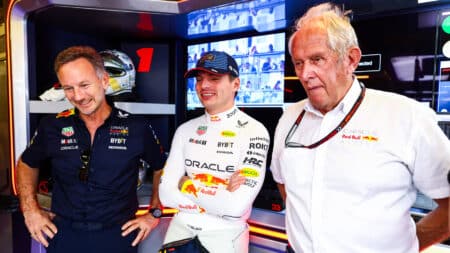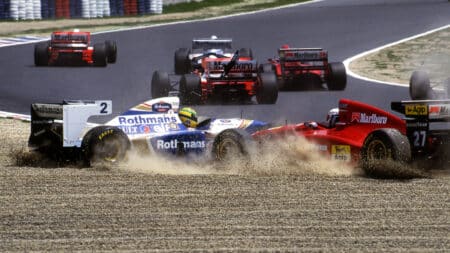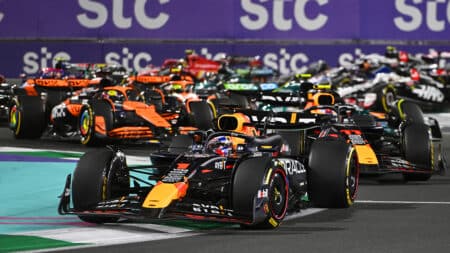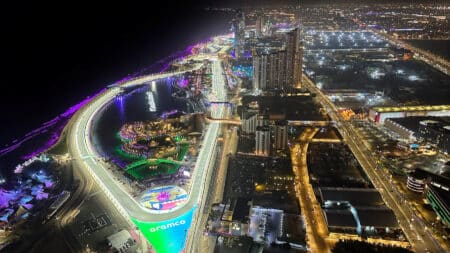
How real are Red Bull's concerns that Verstappen could leave early?
Helmut Marko caused a stir after the Bahrain GP with his worries that Max Verstappen could leave Red Bull early. But how real are those fears?
Fifty years ago this week in the French Grand Prix on June 28, 1964 at the Rouen-les-Essarts road circuit Dan Gurney scored the first F1 World Championship win for Jack Brabham’s small but ferociously competitive team. ‘Black Jack’ had won non-championship races at Solitude and Zeltweg in 1963 as well as the BARC 200 at Aintree in April of ’64 and the International Trophy at Silverstone in May, but Gurney’s win was the team’s first Grand Epreuve victory.
During the ‘60s Gurney established himself as one of the most versatile drivers of all time, winning in F1, long-distance sports cars, Indycars, Can-Am, GT cars, NASCAR stock cars and touring cars in the UK. In those days he was America’s most renowned international racer and Car & Driver promoted a tongue-in-cheek ‘Dan Gurney for President’ campaign in the summer of ’64.
As his career and reputation flourished Dan spent three enjoyable years from 1963-65 driving for Jack Brabham’s Formula 1 team. Two-time world champion Brabham (1959 and ‘60) arrived in Europe from Australia in 1955 and drove for the Cooper team through 1961 before starting to build his own cars in 1962. Brabham raced a Lotus in the opening five Grand Prix races of 1962, then debuted his first Brabham F1 car at the German GP in August.

Brabham’s eponymous car makes its debut
Brabham’s cars were designed by fellow Australian Ron Tauranac who went on to build his own very successful F2, F3, Atlantic and Super Vee cars called Ralts. Tauranac’s designs were more conservative than Colin Chapman’s Lotus creations but they were invariably practical and effective.
The first Brabhams were spaceframe chassis and Tauranac remained faithful to tubular construction for some years. Brabham and Tauranac did not join Chapman’s monocoque movement until 1968 but produced very competitive cars, ultimately winning the World Championship with Brabham and Denny Hulme in 1966 and ‘67 after Dan had moved on to run his own All American Racers team.
Gurney puts Brabham on a par with Stirling Moss, a compliment of the highest order. “Jack and Stirling were competitors from a driving standpoint,” Dan says. “I think the feeling among the competitors was that Moss was better but Jack seemed to be in front more often, or could get to the end more often. Jack was hard to beat. He won plenty of races and championships.
“Probably in his heart Jack knew that Moss had more pure driving ability than he did, but pure driving ability wasn’t what it took to win races. You had to have a damn good amount of that, but you should also help yourself from the technical standpoint, or knowledge of other frontiers and Jack had that.

Moss chases Brabham at Brussels, 1961
“I didn’t realise what an excellent engineer and mechanic Jack was until I joined the team,” Gurney continues. “I think he was way ahead in terms of what they now call engineering and he was pretty doggone good on aerodynamics. As a driver, he seemed to be fighting for first place more often than not. So he was formidable.
Top 10
1. John Surtees, Ferrari 40
2. Graham Hill, BRM 39 (41)
3. Jim Clark, Lotus 32
4. Lorenzo Bandini, Ferrari 23
5. Richie Ginther, BRM 23
6. Dan Gurney, Brabham 19
7. Bruce McLaren, Cooper 13
8. Jack Brabham, Brabham 11
9. Peter Arundell, Lotus 11
10. Jo Siffert, Brabham 7
“Among the drivers, Jack had the ability to think big. After he won the World Championship with Cooper he was looking to build his own assets and once he had the right people with him Jack was ready to take them on, and Ron Tauranac was a very important part of that.
“Tauranac probably didn’t believe the aero side of things as much as Chapman, but I would say the cars he designed were, more often than not, more user-friendly than the Lotus. I’m talking about shades of differences but Tauranac had an exceptional understanding for making his cars user-friendly. Ron was a tremendously gifted designer who understood car dynamics long before most people did.”
The Brabham BT7s that Dan drove in 1963 and ‘64 and the subsequent BT11 of 1965 were very competitive if not the complete equal of the state-of-the-art Lotus 25s and 33s driven by Jim Clark. Gurney believes the Brabham lacked a little to the Lotus in aerodynamic drag. In those days nobody used wind tunnels but Chapman and his aero consultant Frank Costin were renowned for their empirical knowledge of aerodynamics.

Clark, Brabham and Gurney line up at East London, 1963
Clark dominated the 1963 world championship aboard Chapman’s Lotus 25. In his fourth year with Lotus, Clark took his first world title by winning seven of 10 races. He also took seven poles. Gurney finished fifth in the ’63 championship behind BRM drivers Richie Ginther and Graham Hill and Ferrari’s lead driver John Surtees. Dan finished third at Spa, second at Zandvoort, and was second again to Clark in the season-closer in South Africa where he also turned the fastest lap.
In 1964 Surtees won the championship for Ferrari, beating Graham Hill and Clark to the title. Dan was extremely competitive in many races but reliability issues kept him from being a championship threat and he finished sixth in points. Gurney was on the pole in Holland and again in Belgium where he dominated the race at the mighty Spa-Francorchamps track until running out of fuel in the closing laps.
“I came close to winning at Spa with the Brabham,” Dan remarks. “That car was fine at Spa. I was on the pole and led most of the race. I had a big lead and ran out of fuel. It was very disappointing.”
Two weeks after failing to finish at Spa, Gurney scored the Brabham team’s first World Championship victory at Rouen, one of his favorite tracks where he had scored his first GP win two years earlier driving for Porsche. Dan qualified in the middle of the front in France between Clark and Surtees and won from Graham Hill’s BRM after Clark’s Lotus broke. Gurney also led many laps at Monza before hitting trouble, then won the season-closer in Mexico City after Clark dropped out.

Mexico ’64: Gurney looks on as Surtees is crowned
Brabham said later that he wanted Gurney to continue with his team to go after the World Championship but Dan was fully occupied with getting All American Racers up and running to build Eagle F1 and Indycars. “We had a good relationship and had I continued with him I think Jack would have retired a little sooner and maybe not have won his third World Championship,” Dan remarks. “I didn’t ask Jack for anything. We just wanted a chance to win races and we had a very good relationship. I enjoyed my time with the Brabham team a lot. It was a very important part of my career.”
Well-known historic racer James King and his son Alex have put together a film from footage the teenaged James shot of the 1964 F1 season in Europe. King races an ex-Gurney Brabham BT7-Climax and his film focuses on Gurney’s efforts that year racing against Clark, Surtees and Hill. Enjoy King’s short film Summer of ’64:

Helmut Marko caused a stir after the Bahrain GP with his worries that Max Verstappen could leave Red Bull early. But how real are those fears?

Ayrton Senna’s tragic final races in 1994, marked by controversy over illegal traction control and his relentless pursuit of excellence in a challenging car, remain a poignant chapter in F1 history, as Matt Bishop recalls

Full F1 schedule for the year, including the next F1 race of 2025: the Saudi Arabian Grand Prix, the whole calendar and circuit guides for the 24-race Formula 1 season

Round five of the 2025 Formula 1 season wraps up the first triple-header of the year in Saudi Arabia. There are the dates and start time for the Jeddah event, including all sessions